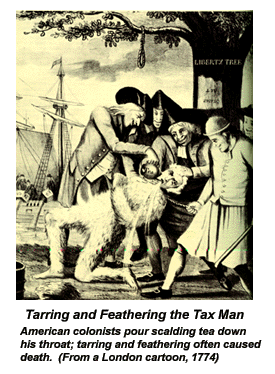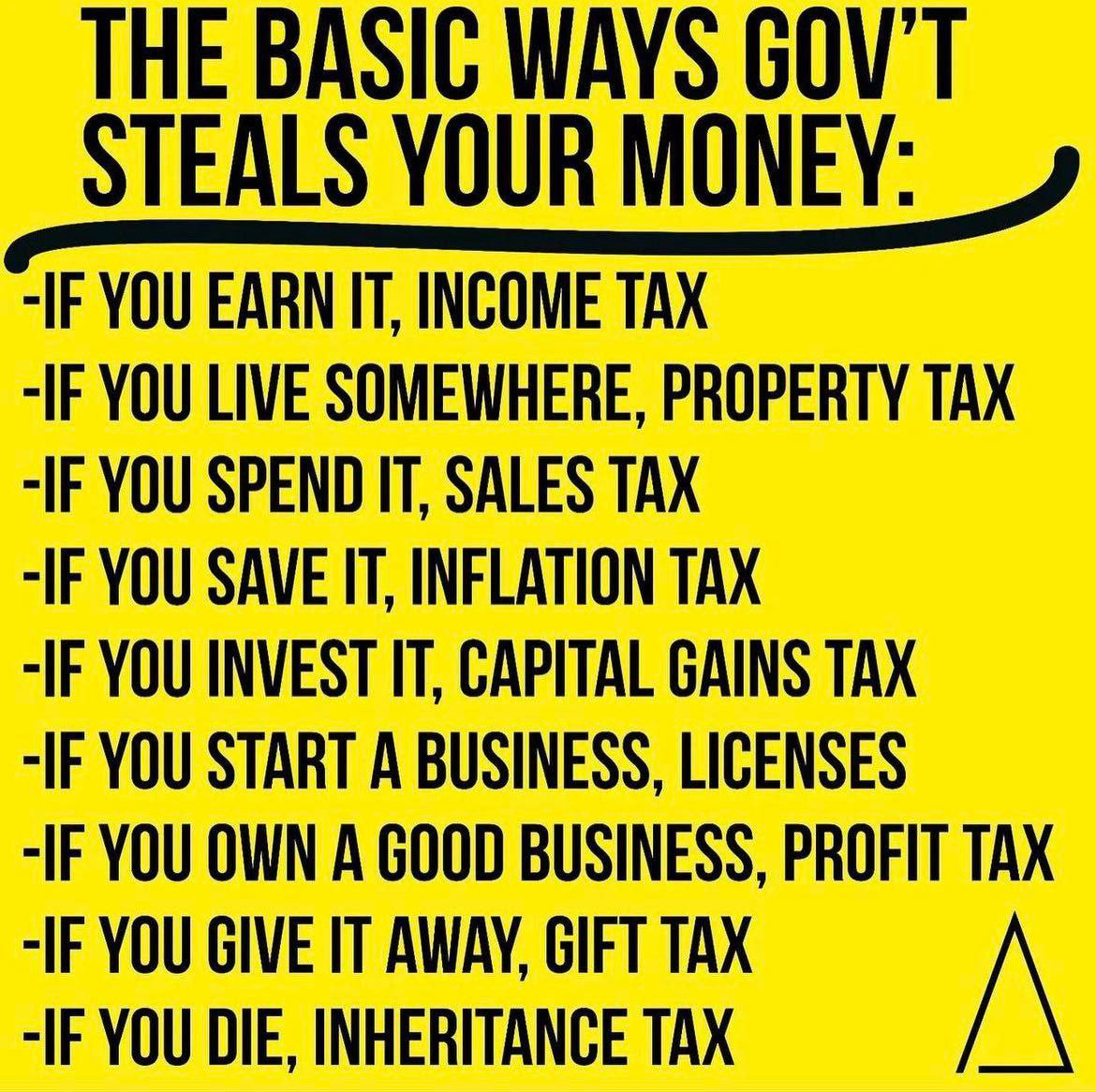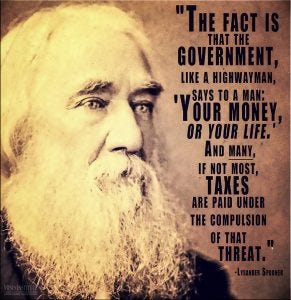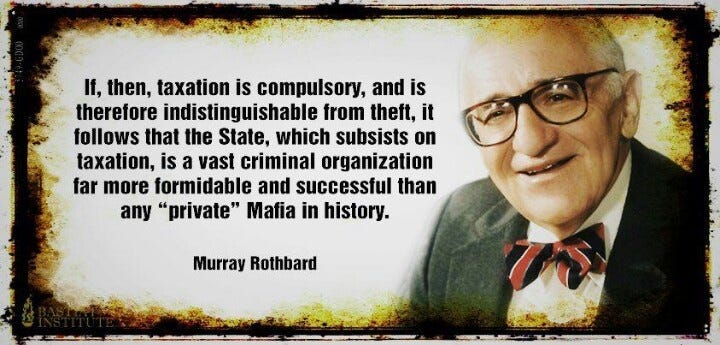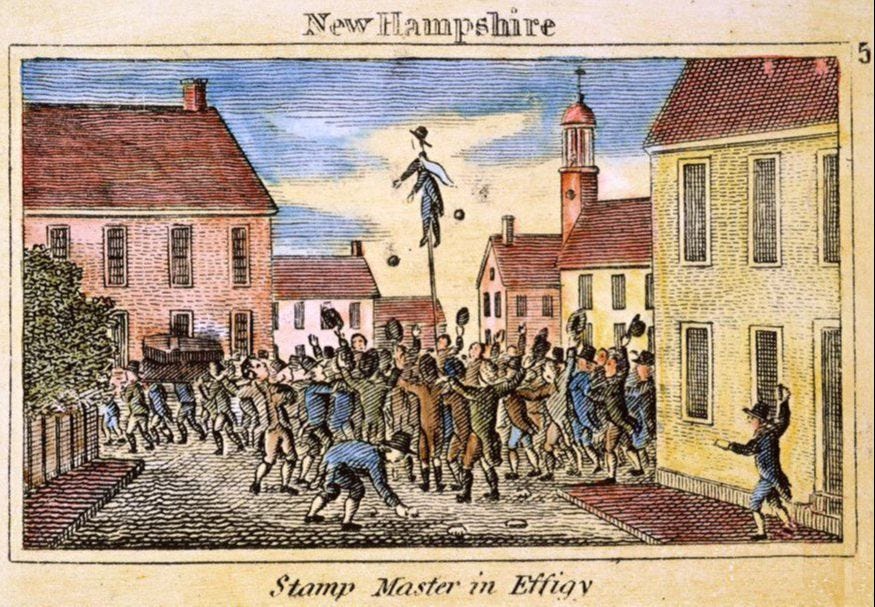They tax you when you sell, they tax you when you buy. They take half when you live and they take half when you die…
Source: The Rutherford Institute
Disarm the IRS, De-Militarize the Bureaucracy, and Dismantle the Standing Army
By John & Nisha Whitehead
May 02, 2023
“There are instruments so dangerous to the rights of the nation and which place them so totally at the mercy of their governors that those governors, whether legislative or executive, should be restrained from keeping such instruments on foot but in well-defined cases. Such an instrument is a standing army.”
—Thomas Jefferson, 1789
What does it say about the state of our freedoms that there are now more pencil-pushing, bureaucratic (non-military) government agents armed with weapons than U.S. Marines?
Among the agencies being supplied with night-vision equipment, body armor, hollow-point bullets, shotguns, drones, assault rifles and LP gas cannons are the IRS, Smithsonian, U.S. Mint, Health and Human Services, FDA, Small Business Administration, Social Security Administration, National Oceanic and Atmospheric Administration, Education Department, Energy Department, Bureau of Engraving and Printing and an assortment of public universities.
Add in the Biden Administration’s plans to swell the ranks of the IRS by 87,000 new employees (some of whom will be authorized to use deadly force) and grow the nation’s police forces by 100,000 more cops, and you’ve got a nation in the throes of martial law.
We’re being frog-marched into tyranny at the end of a loaded gun.
Make that hundreds of thousands of loaded guns.
According to the Wall Street Journal, the number of federal agents armed with guns, ammunition and military-style equipment, authorized to make arrests, and trained in military tactics has nearly tripled over the past several decades.
As Adam Andrzejewski writes for Forbes, “the federal government has become one never-ending gun show.”
While Americans have to jump through an increasing number of hoops in order to own a gun, federal agencies have been placing orders for hundreds of millions of rounds of hollow point bullets and military gear.
For example, the IRS has stockpiled 4,500 guns and five million rounds of ammunition in recent years, including 621 shotguns, 539 long-barrel rifles and 15 submachine guns.
The Veterans Administration purchased 11 million rounds of ammunition (equivalent to 2,800 rounds for each of their officers), along with camouflage uniforms, riot helmets and shields, specialized image enhancement devices and tactical lighting.
The Department of Health and Human Services acquired 4 million rounds of ammunition, in addition to 1,300 guns, including five submachine guns and 189 automatic firearms for its Office of Inspector General.
According to an in-depth report on “The Militarization of the U.S. Executive Agencies,” the Social Security Administration secured 800,000 rounds of ammunition for their special agents, as well as armor and guns.
The Environmental Protection Agency owns 600 guns. The Smithsonian now employs 620-armed “special agents.”
Even agencies such as Amtrak and NASA have their own SWAT teams.
Ask yourselves: why are government agencies being turned into military outposts?
What’s with the buildup of SWAT teams within non-security-related federal agencies? Even the Department of Agriculture, the Railroad Retirement Board, the Tennessee Valley Authority, the Office of Personnel Management, the Consumer Product Safety Commission, the U.S. Fish and Wildlife Service and the Education Department have their own SWAT teams. Most of those officers are under the command of either the Department of Homeland Security or the Department of Justice.
Why does the Department of Agriculture need .40 caliber semiautomatic submachine guns and hollow point bullets? For that matter, why do its agents need ballistic vests and body armor?
For that matter, why do IRS agents need AR-15 rifles?
Why do local police need armored personnel carriers with gun ports, compact submachine guns with 30-round magazines, precision battlefield sniper rifles, and military-grade assault-style rifles and carbines?
Why is the federal government distributing obscene amounts of military equipment, weapons and ammunition to police departments around the country?
Why is the military partnering with local police to conduct training drills around the country? And what exactly are they training for? The public has been disallowed from obtaining any information about the purpose of these realistic urban training drills, other than that they might be loud and to not be alarmed.
We should be alarmed.
As James Madison warned, “We are right to take alarm at the first experiment upon our liberties.”
Unfortunately, we’re long past the first experiment on our freedoms, and merely taking alarm over this build-up of military might will no longer suffice.
Nothing about this de facto army of bureaucratic, administrative, non-military, paper-pushing, non-traditional law enforcement agencies is necessary for national security.
Moreover, while these weaponized, militarized, civilian forces which are armed with military-style guns, ammunition and equipment; trained in military tactics; and authorized to make arrests and use deadly force—may look and act like the military, they are not the military.
Rather, they are foot soldiers of the police state’s standing army, and they are growing in number at an alarming rate.
This standing army—a.k.a. a national police force—vested with the power to completely disregard the Constitution and rule by force is exactly what America’s founders feared, and its danger cannot be overstated or ignored.
This is exactly what martial law looks like—when a government disregards constitutional freedoms and imposes its will through military force, only this is martial law without any government body having to declare it: Battlefield tactics. Militarized police. Riot and camouflage gear. Armored vehicles. Mass arrests. Pepper spray. Tear gas. Batons. Strip searches. Drones. Less-than-lethal weapons unleashed with deadly force. Rubber bullets. Water cannons. Concussion grenades. Intimidation tactics. Brute force. Laws conveniently discarded when it suits the government’s purpose.
The militarization of America’s police forces in recent decades, which has gone hand in hand with the militarization of America’s bureaucratic agencies, has merely sped up the timeline by which the nation is transformed into an authoritarian regime.
Now we find ourselves struggling to retain some semblance of freedom in the face of administrative, police and law enforcement agencies that look and act like the military with little to no regard for the Fourth Amendment, laws such as the NDAA that allow the military to arrest and indefinitely detain American citizens, and military drills that acclimate the American people to the sight of armored tanks in the streets, military encampments in cities, and combat aircraft patrolling overhead.
This quasi-state of martial law has been helped along by government policies and court rulings that have made it easier for the police to shoot unarmed citizens, for law enforcement agencies to seize cash and other valuable private property under the guise of asset forfeiture, for military weapons and tactics to be deployed on American soil, for government agencies to carry out round-the-clock surveillance, for legislatures to render otherwise lawful activities as extremist if they appear to be anti-government, for profit-driven private prisons to lock up greater numbers of Americans, for homes to be raided and searched under the pretext of national security, for American citizens to be labeled terrorists and stripped of their rights merely on the say-so of a government bureaucrat, and for pre-crime tactics to be adopted nationwide that strip Americans of the right to be assumed innocent until proven guilty and creates a suspect society in which we are all guilty until proven otherwise.
Don’t delude yourself into believing that this thinly-veiled exercise in martial law is anything other than an attempt to bulldoze what remains of the Constitution and reinforce the iron-fisted rule of the police state.
This is no longer about partisan politics or civil unrest or even authoritarian impulses.
This is a turning point.
As I make clear in my book Battlefield America: The War on the American People and in its fictional counterpart The Erik Blair Diaries, we are sliding fast down a slippery slope to a Constitution-free America.
If we are to have any hope of salvaging what’s left of our battered freedoms, we’d do well to start by disarming the IRS and the rest of the federal and state bureaucratic agencies, de-militarizing domestic police forces, and dismantling the police state’s standing army.
ABOUT JOHN W. WHITEHEAD
Constitutional attorney and author John W. Whitehead is founder and president of The Rutherford Institute. His most recent books are the best-selling Battlefield America: The War on the American People, the award-winning A Government of Wolves: The Emerging American Police State, and a debut dystopian fiction novel, The Erik Blair Diaries. Whitehead can be contacted at staff@rutherford.org. Nisha Whitehead is the Executive Director of The Rutherford Institute. Information about The Rutherford Institute is available at www.rutherford.org.
Source: American Greatness
Watchdog: IRS has Spent $10M on Weapons, Ammunition, and Combat Gear Since 2020
By Eric Lendrum
May 3, 2023
Anew watchdog report reveals that the Internal Revenue Service (IRS) has been stockpiling $10 million worth of weapons, ammunition, and combat gear since 2020.
The New York Post reports that the findings, released by the group OpenTheBooks, show the IRS spending $5 million in 2021 alone as the agency ramped up the militarization of its agents. In the last three years, the IRS has spent a total of $2.3 million on ammunition, $1.2 million on ballistic shields, $474,000 on Smith & Wesson rifles, $463,000 on Beretta tactical shotguns, and $243,000 on body armor.
In addition to these purchases, the IRS’ expenditures include an additional $1.3 million that was spent on “various other gear for criminal investigation agents,” without any specifics as to what this “other gear” may entail.
The slew of new purchases build off of an arsenal that was already well-stocked prior to 2020, with the IRS already having in its possession roughly 5 million rounds of ammunition designated for its 2,159 special agents. Before 2020, the IRS owned 4,500 firearms, which included 621 shotguns, 539 semi-automatic rifles, and 15 submachine guns.
In conjunction with the spike in weapons purchases, the IRS has been hiring significantly more agents in all 50 states. In the job listing for new applicants, the agency notes that any potential applicants must be willing to “carry a firearm; must be prepared to protect him/herself or others from physical attacks at any time and without warning and use firearms in life-threatening situations; must be willing to use force up to and including the use of deadly force.”
The weapon stockpiling and additional hiring comes after the IRS was given over $80 billion in new funding as a result of the highly-partisan Inflation Reduction Act, which was worth $739 billion overall. The agency has since claimed that the $80 billion was necessary in order to hire nearly 87,000 new agents across the country over the next 10 years, which has raised concerns among Republicans about the weaponization of an agency that has already been used to target conservatives in the past.
About Eric Lendrum
Eric Lendrum graduated from the University of California, Santa Barbara, where he was the Secretary of the College Republicans and the founding chairman of the school’s Young Americans for Freedom chapter. He has interned for Young America’s Foundation, the Heritage Foundation, and the White House, and has worked for numerous campaigns including the 2018 re-election of Congressman Devin Nunes (CA-22). He is currently a co-host of The Right Take podcast.
Source: Voluntaryist.com
Original Source: An Essay on the Trial by Jury (1852)
“TAXATION” BY LYSANDER SPOONER
Appendix to AN ESSAY ON THE TRIAL BY JURY (1852)
“Taxation”
Lysander Spooner
It was a principle of the Common Law, as it is of the law of nature, and of common sense, that no man can be taxed without his personal consent. The Common Law knew nothing of that system, which now prevails in England, of assuming a man’s own consent to be taxed, because some pretended representative, whom he never authorized to act for him, has taken it upon himself to consent that he may be taxed. That is one of the many frauds on the Common Law, and the English constitution, which have been introduced since Magna Carta. Having finally established itself in England, it has been stupidly and servilely copied and submitted to in the United States.
If the trial by jury were re-established, the Common Law principle of taxation would be re-established with it; for it is not to be supposed that juries would enforce a tax upon an individual which he had never agreed to pay. Taxation without consent is as plainly robbery, when enforced against one man, as when enforced against millions; and it is not to be imagined that juries could be blind to so self-evident a principle. Taking a man’s money without his consent, is also as much robbery, when it is done by millions of men, acting in concert, and calling themselves a government, as when it is done by a single individual, acting on his own responsibility, and calling himself a highwayman. Neither the numbers engaged in the act, nor the different characters they assume as a cover for the act, alter the nature of the act itself.
If the government can take a man’s money without his consent, there is no limit to the additional tyranny it may practice upon him; for, with his money, it can hire soldiers to stand over him, keep him in subjection, plunder him at discretion, and kill him if he resists. And governments always will do this, as they everywhere and always have done it, except where the Common Law principle has been established. It is therefore a first principle, a very sine qua non of political freedom, that a man can be taxed only by his personal consent. And the establishment of this principle, with trial by jury, insures freedom of course; because: 1. No man would pay his money unless he had first contracted for such a government as he was willing to support; and, 2. Unless the government then kept itself within the terms of its contract, juries would not enforce the payment of the tax. Besides, the agreement to be taxed would probably be entered into but for a year at a time. If, in that year, the government proved itself either inefficient or tyrannical, to any serious degree, the contract would not be renewed. The dissatisfied parties, if sufficiently numerous for a new organization, would form themselves into a separate association for mutual protection. If not sufficiently numerous for that purpose, those who were conscientious would forego all governmental protection, rather than contribute to the support of a government which they deemed unjust.
All legitimate government is a mutual insurance company, voluntarily agreed upon by the parties to it, for the protection of their rights against wrong-doers. In its voluntary character it is precisely similar to an association for mutual protection against fire or a shipwreck. Before a man will join an association for these latter purposes, and pay the premium for being insured, he will, if he be a man of sense, look at the articles of the association; see what the company promises to do; what it is likely to do; and what are the rates of insurance. If he be satisfied on all these points, he will become a member, pay his premium for a year, and then hold the company to its contract. If the conduct of the company prove unsatisfactory, he will let his policy expire at the end of the year for which he has paid; will decline to pay any further premiums, and either seek insurance elsewhere, or take his own risk without any insurance. And as men act in the insurance of their ships and dwellings, they would act in the insurance of their properties, liberties and lives, in the political association, or government.
The political insurance company, or government, have no more right, in nature or reason, to assume a man’s consent to be protected by them, and to be taxed for that protection, when he has given no actual consent, than a fire or marine insurance company have to assume a man’s consent to be protected by them, and to pay the premium, when his actual consent has never been given. To take a man’s property without his consent is robbery; and to assume his consent, where no actual consent is given, makes the taking none the less robbery. If it did, the highwayman has the same right to assume a man’s consent to part with his purse, that any other man, or body of men, can have. And his assumption would afford as much moral justification for his robbery as does a like assumption, on the part of the government, for taking a man’s property without his consent. The government’s pretence of protecting him, as an equivalent for the taxation, affords no justification. It is for himself to decide whether he desires such protection as the government offers him. If he do not desire it, or do not bargain for it, the government has no more right than any other insurance company to impose it upon him, or make him pay for it.
Trial by the country, and no taxation without consent, were the two pillars of English liberty, (when England had any liberty,) and the first principles of the Common Law. They mutually sustain each other; and neither can stand without the other. Without both, no people have any guaranty for their freedom; with both, no people can be otherwise than free. [1]
By what force, fraud, and conspiracy, on the part of kings, nobles, and “a few wealthy freeholders,” these pillars have been prostrated in England [as in the rest of the world], it is desired to show more fully in the next volume, if it should be necessary.
[1] Trial by the country, and no taxation without consent, mutually sustain each other, and can be sustained only by each other, for these reasons:
Juries would refuse to enforce a tax against a man who had never agreed to pay it. They would also protect men in forcibly resisting the collection of taxes to which they had never consented. Otherwise the jurors would authorize the government to tax themselves without their consent, a thing which no jury would be likely to do. In these two ways, then, trial by the country would sustain the principle of no taxation without consent.
On the other hand, the principle of no taxation without consent would sustain the trial by the country, because men in general would not consent to be taxed for the support of a government under which trial by the country was not secured.
Thus these two principles mutually sustain each other.
But, if either of these principles were broken down, the other would fall with it, and for these reasons: If trial by the country were broken down, the principle of no taxation without consent would fall with it, because the government would then be able to tax the people without their consent, inasmuch as the legal tribunals would be mere tools of the government, and would enforce such taxation, and punish men for resisting such taxation, as the government ordered.
On the other hand, if the principle of no taxation without consent were broken down, trial by the country would fall with it, because the government, if it could tax people without their consent, would, of course, take enough of their money to enable it to employ all the force necessary for sustaining its own tribunals, (in the place of juries,) and carrying their decrees into execution.
Source: Students of History
British Acts Anger the Colonies
By the 1760’s, European colonists had been settled in North America for over 150 years and the American colonies were thriving. Britain's Parliament passed a series of acts between 1760 and 1775 that would create and/or increase taxes on goods, commerce, and trade in the colonies.
Much of this tax would be used to pay for the British debt after the long and costly French and Indian War. The American colonists felt this was unfair because they were not able to vote in parliamentary elections and therefore had no voice in the matter. This led to the famous motto, “No taxation without representation”.
The Stamp Act, Sugar Act, Townshend Acts, and Intolerable Acts are four acts that contributed to the tension and unrest among colonists that ultimately led to the American Revolution.
The first act was the Sugar Act, which was passed in 1764. This placed a tax on sugar and molasses imported into the colonies.
This was a huge disruption to the Boston and New England economies because they used sugar and molasses to make rum, a main export in their trade with other countries. This act prompted many New England colonists to boycott British imports and led to the need for colonists to become more self-sufficient and rely less on British goods.
A year later, in 1765, the Stamp Act was passed. This placed a tax on all printed materials such as newspapers, magazines, and legal documents. Even playing cards and pamphlets needed an official tax stamp. This created an outrage among the colonists and many began protesting the acts. A protest convention known as the Stamp Act Congress was even held with delegates from nine colonies.
The Townshend Acts were a series of acts passed in 1767 and 1768 that placed indirect taxes on imports British goods such as glass, lead, pants, paper, and tea. These acts were also met with protests from the colonies, and the British government had to send troops to enforce the taxes.
The most famous of these protests was the Boston Tea Party. In December 1773, the Sons of Liberty led a group onto British East India Company ships and dumped over 300 chests of British tea into Boston Harbor.
To punish the colonists (and especially Massachusetts), British Parliament passed the Coercive Acts in 1774. In the American Colonies, these became known as the Intolerable Acts and included 5 total acts:
The Boston Port Act
Massachusetts Government Act
Administration of Justice Act
Quartering Act
Quebec Act
These acts took away rights and self-governance in Massachusetts and caused further outrage and protests across the 13 Colonies. In September 1774, the First Continental Congress was formed to decide how to respond to the British government's actions.
Ways to connect
Telegram: @JoelWalbert
Email: thetruthaddict@tutanota.com
The Truth Addict Telegram channel
Hard Truth Soldier chat on Telegram
Mastodon: @thetruthaddict@noagendasocial.com
Session: 05e7fa1d9e7dcae8512eed0702531272de14a7f1e392591432551a336feb48357c
Odysee: TruthAddict
Donations (#Value4Value)
Bitcoin:
bc1qe8enf89g667dy890j2lnt637xqlt9wvc9f07un (on chain)
bc1qnqjdudgc0qr5yfrp826nxes8kljf9p07mwt3q3yjrd6gqwj0lqtswmy39s (lightning)
nemesis@getalby.com
joelw@fountain.fm
+wildviolet72C (PayNym)
Monero:
43E8i7Pzv1APDJJPEuNnQAV914RqzbNae15UKKurntVhbeTznmXr1P3GYzK9mMDnVR8C1fd8VRbzEf1iYuL3La3q7pcNmeN




